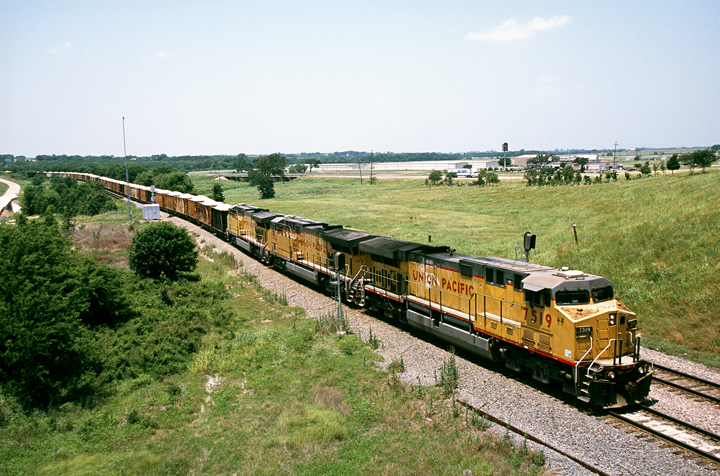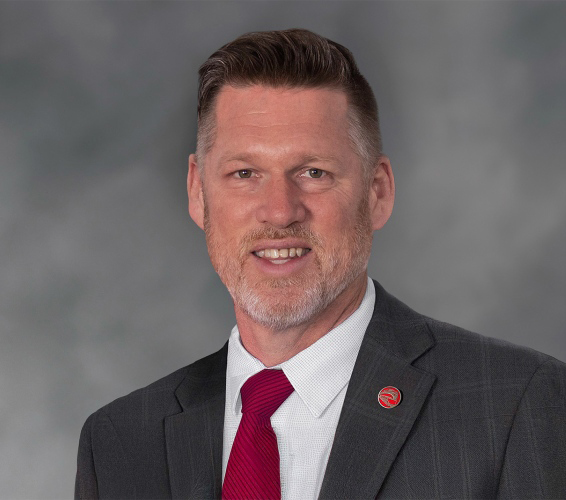Compared to a year ago, CSX’s on-time originations fell 2 points, to 83 percent, while on-time arrivals dropped 2 points, to 59 percent for the quarter, the railroad reported on July 17 as part of its quarterly earnings release.
CSX needs to improve both measures, CEO Jim Foote says, although well over 90 percent of trains depart within two hours of their scheduled times.
“We don’t get them across the network as effectively as we should,” Foote told investors and analysts during the railroad’s earnings call.
“That’s unacceptable,” he says.
CSX has rolled out trip plans that schedule and monitor every carload and intermodal container in real time. The plans will help the railroad identify service failures and ultimately prevent them, Foote says.
Compliance with the trip plans currently stands in the 60-percent range but needs to be 100 percent, Foote says.
Ultimately, Foote wants CSX people to recognize when there’s a service failure, such as a car that missed a scheduled connection, then go above and beyond the call of duty to get the car onto the next train.
Making this happen will require a cultural change at CSX, Foote says.
Providing more reliable service is critical to CSX’s business strategy. Foote says the railroad aims to differentiate its service product, which will then allow it to charge higher rates and gain volume.
For the quarter, CSX trains moved faster, as speed edged up 15 percent to 17.4 mph, and cars spent less time in yards as terminal dwell improved by 10 percent, to 9.7 hours using CSX measurements that differ from the Association of American Railroads standard.
Average train length also increased 13 percent compared to a year ago.
“Moving all three of these metrics at the same time is no easy task,” Foote says, noting that there’s still plenty room for improvement.
Wall Street analysts on yesterday’s earnings call did not ask CSX executives about the pending reopening of the hump at Radnor Yard in Nashville. The hump was idled last year as former CEO E. Hunter Harrison, who died in December, converted eight of the railroad’s dozen hump yards to flat-switching facilities.
CSX has said that reducing car handlings en route by bypassing hump yards cuts transit time and makes service more reliable.
But not all merchandise shippers have seen improvements under the new operating plan, which continues to undergo refinements.
A shipper tells Trains News Wire that transit times are generally longer now than they were before Harrison arrived at the railroad in March 2016. While transit time has declined in a couple of origin-destination pairs, the shipper says most shipments are taking a day or two longer.
Recent changes to the routings for cars bound for a receiver in Alabama have added three to four days to the previous transit time of 10 days, the shipper says. The reason? Eastbound cars that used to move directly to the destination now are routed to the hump yard at Waycross, Ga., then move west back to Alabama.















Taking 3 to 4 extra days because cars are routed all over the place will require something other than a “cultural change”. Seeing as computers track the cars and designate where they go it appears to not be a personnel problem but a system problem.
Lol.Michael Ward is unavailable for comment
Tilford in Atlanta. One of those hump yards that was supposed to have been “converted to flat switching”. Well, you can’t do any flat switching on gravel when a yard is completely TORN OUT!
Radnor had to be reopened because of every CSX On Line customer in the northern half of Georgia that depended on Tilford for block swapping of their shipments.
CSX should either bite the bullet and continue to pay the State of Georgia rent on the W&A or spin all that lucrative traffic off to a healthy Regional or a competitor like NS.
All this to eliminate one line item on the red side of the books. Thumbs down! ??
Employees embrace change? They have no choice but to embrace it if they wish to remain employees. Morale has already been destroyed so how about a cease and desist from continuing to blame them for your hideous management and operational failures.
I am astounded that putting a mis-connect car on the next train is, “going above the call of duty.” So if it misses it connection, it goes nowhere, ever again? As Ken illustrated, hell of a way to run a railroad, or any business.
Yeah, this from a scrungy railroad that promised EHH $84 million above and beyond his already ridiculously high salary, so that he could grind the railroad to a halt.
If Foote wants his employees to go “above and beyond the call” maybe he himself could lead by example and give up some of his compensation and put the money into providing safety equipment (vests, boots gloves etc.) to his employees instead of making them buy it themselves. Going “above and beyond the call” should apply to everyone from the top down.
Seems like with the shortage of operating, electrical and mechanical personnel these people would be leaving in droves to get sign on bonuses from other railroads. A yard conductor in Chicago told me a week ago that his shift had 4 crews scheduled but his was the only one working that day, because there were no conductors available for the other three.
Kept my shares. My friends work hard and do their jobs at CSX.
Awww snap! Anytime a high level company official starts talking “culture change”, that is just double-speak to the Lowers that means bend over, touch your toes, and don’t get your hope’s up for lube!
OK, here’s a real life story as to why culture change is needed.
I didn’t work for CSX, I worked for the ICG in intermodal marketing. We had an important high volume customer that paid the full rate. But they needed good service.
So they had “a number” of trailers loaded at our Kankakee ramp on Friday afternoon. The loads needed to be available in New Orleans Monday Morning. Not normally a problem. TOFC #51 would do a pick up in KKK on Saturday and have the loads in New Orleans by midnight (or so) Sunday. The customer called me with the flatcar numbers. I wrote the numbers down and took them to our intermodal operations people telling them that there was a “Hot Pick Up” in Kankakee on Saturday. I heard nothing further over the weekend.
So, when I walked in Monday morning my phone was ringing. It was the angry shipper wanting to know why their trailers were still sitting in Kankakee when they should have been unloading in New Orleans. I had no answer. All I could do was listen to an important customer read me the riot act, tell him I’d get his freight moving, and find out what went wrong.
So, I called our incredibly bad railroad operating department. What happened? Well, their story was that #51 was long leaving Chicago and the temperature was really cold. So they just decided to screw the customer and run by the KKK pick up. (Which I had noted as “Hot”.) Then they did nothing. They just let the loads sit. #51 ran on Sunday and they just didn’t bother to do a pick up on Sunday either. (Sunday’s #51 had 27 cars.) At that time #51 operated with a four person crew who had to work all the way from Chicago to Champaign, IL.
After finding out what went wrong I just sat there wondering how I could explain to the customer that we didn’t move his freight because it was “Too Cold”.
The GD operating department was willing to kick the customer in the nuts and not lift a finger to come up with a solution. Heck Fire, they didn’t even bother to call me at home.
Dereliction of duty such as that cannot be tolerated. I hope CSX is able to make the culture change.
Foote talks a good game, but that’s about all. It is hard to see how a work force as mis-treated as the CSX work force has been will go “above and beyond the call” to fix service failures. When CSX does stupid things like routing cars out of their way, it’s hard to see how they will build up any good will among the shippers. CSX can put the shippers first or Wall Street first but not both.
“Ultimately, Foote wants CSX people to recognize when there’s a service failure, such as a car that missed a scheduled connection, then go above and beyond the call of duty to get the car onto the next train.”
Wait a minute, I thought the late, great (but yet the sun still seems to rise in his absence) world’s greatest railroader got rid of the anti cultural change people already.
As for going above and beyond, I take it we can expect the same out of management?
As for the “we can charge higher rates and gain volume” comment…seriously?
The answer to the problem is more cuts ! Doesn’t that usually fix everything !!!!!!!!!!!
Ahhh, but the shareholders still get the dividend for setting up such a lousy organization. The CN is now going back to its roots. Unbelievable.
“Service improvements will require cultural change at railroad.” Oh, how the brass speaks (must’ve learn from Hunter.)
CSX wants service improvements. How about a cultural change at the top, instead of the railroad end? They keep pushing the field people (trainmen, MOW, dispatchers, to name a few) in this manner, it won’t be long before CSX could be looking at a system-wide strike on their hands.
I use the example of a horse. The owner treats the horse well, the animal will do its job and remain loyal. But, if the horse starts getting mistreated, it is not long before one of two things occur: either it dies, or rebels (and can rebel viciously). As with CSX, in this case, just like at CN and CP, workers get tired of being pushed relentlessly, and being treated like $#@&, rebellion (i.e. a strike) gets in the wind. Unlike in Canada, CSX people strike, it will be quite the show to see what comes of it.
I could NOT be happier I unloaded my shares in this train wreck (pun intended.)
More “Precision Scheduled Railroading” hype for the Wall St. crowd, nothing more.